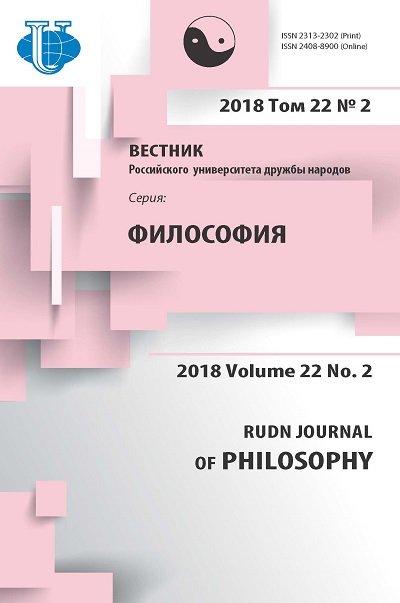Bridge As-Sirat as a way to the Truth: Nasir Khusraw’s interpretation
- Authors: Korneeva TG1
-
Affiliations:
- The Institute of Philosophy, Russian Academy of Sciences
- Issue: Vol 22, No 2 (2018)
- Pages: 226-235
- Section: HISTORY OF PHILOSOPHY
- URL: https://journals.rudn.ru/philosophy/article/view/18717
- DOI: https://doi.org/10.22363/2313-2302-2018-22-2-226-235
- ID: 18717
Cite item
Full Text
Abstract
The article is dedicated to the interpretation of the concept of “Bridge As-Sirat” by the Persian philosopher of the 11th century Nasir Khusraw. We can identify two positions in Islam regarding the ways of interpreting the verses of the Qur'an: one group insisted on a direct, literal interpretation of the Quran, while others claimed the need for an esoteric interpretation of the text. Nasir Khusraw applies the method of interpreting “ta’vil” to the text of Revelation and Hadith, which allows him to interpret religious concepts in a philosophical way and fill them with new meanings. According to the Ismaili philosopher the Bridge As-Sirat is an image of man's spiritual path. At the end of this path, a person's soul falls either to heaven or to hell. Nasir Khusraw said that paradise is the return of the individual soul to its source (the Universal Soul) and hell is not a place where the punishment will be committed, but it is a state of the soul that can not return to its source, and therefore suffers, trapped within the boundaries of the material world. The article is accompanied by the translation of a passage from the philosophical treatise Nasir Khusraw “Gushayish va rakhayish” (“Knowledge and Liberation”), devoted to the explanation of the concept of “Bridge As-Sirat”.
Keywords
About the authors
T G Korneeva
The Institute of Philosophy, Russian Academy of Sciences
Author for correspondence.
Email: tankorney@gmail.com
-
Goncharnaya st., 12/1, Moscow, Russia 109240References
- Khansberger E. K. Nasir Khusrav — rubin Badakhshana. Portret persidskogo poeta, puteshestvennika, filosofa. M.: Ladomir, 2005. (in Russ.)
- Daftari F. Traditsii ismailizma v srednie veka. M.: Ladomir, 2006, p. 146. (in Russ.)
- Morewedge P. Introduction. Nasir Khusraw. Knowledge and liberation. A treatise on Philosophical Theology, trans. By Faquir M. Hunzai, intr. And comm. Parviz Morewedge. London: I.B. Tauris &Co Ltd, 1999. p. 10.
- Khansberger EK. Nasir Khusrav — rubin Badakhshana. Portret persidskogo poeta, puteshestvennika, filosofa, M.: Ladomir 2005, p. 35. (in Russ.)
- Al-Gazali, Abu Khamid. Vozrozhdenie religioznykh nauk / Abu Khamid Mukhammad al'-Gazali at-Tusi. Per. s arab. yaz. knigi “Ikhia’ ‘ulum ad-din”. V 10 tomakh. T. 1, 2-e izdanie. Makhachkala: Nurul' irshad, 2011. p. 289. (in Russ.)
- Al-Gazali, Abu Khamid. Vozrozhdenie religioznykh nauk / Abu Khamid Mukhammad al'-Gazali at-Tusi. Per. s arab. yaz. knigi “Ikhia’ ‘ulum ad-din”. V 10 tomakh. T. 1, 2-e izdanie. Makhachkala: Nurul' irshad, 2011. s. 316. (in Russ.)
- Chunakova OM. Pekhleviiskii slovar' zoroastriiskikh terminov, mificheskikh personazhei i mifologicheskikh simvolov; In-t vostokovedeniya, S.-Peterburg. fil. M.: Vost. lit. P. 256—258. (in Russ.)
- Smirnov AV. Slovar' kategorii i ponyatii: arabskaya filosofiya. Universalii vostochnykh kul'tur. M.: Izd. firma “Vost. lit-ra” RAN, 2001. P. 318. (in Russ.)
- Poonawala I.K. Al-Sijistani and his Kitab al-Maqalid al-Malakutiyya; Ishraq: Islamic Philosophy Yearbook: 2013. No. 4. M.: Vost. lit., 2013. P. 168.
- Al-Kirmani, Khamid ad-Din. Uspokoenie razuma (Rahat al-akl'). M.: Ladomir, 1995, p. 34. (in Russ.)
- Nasir Khusrav. Gushaiish va rakhaiish (Raskrytie i osvobozhdenie). London: I.B. Tauris, 1999. 92 p. (in Persian)
- Al-Bukhari. Sahih. Al-Riyad: Maktaba ar-rashd. 1427 y.h. / 2006, pp. 827—828. (in Arabic)
Supplementary files















